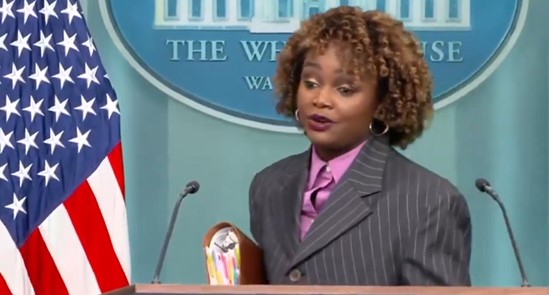White House Press Secretary Karine Jean-Pierre faced significant scrutiny during a press briefing when confronted by FOX News reporter Peter Doocy regarding the administration’s handling of Hurricane Helene relief efforts. Doocy highlighted the stark contrast between the federal government’s funding for international aid, such as the money sent to Lebanon, and the insufficient aid provided to disaster victims in North Carolina, emphasizing the administration’s apparent prioritization of foreign assistance over domestic needs. Jean-Pierre, visibly agitated, failed to address the critical question directly, instead opting to defend the government’s response to Hurricane Helene and labeling Doocy’s inquiries as “disinformation.” This confrontation reflects the increasing tensions between the administration and the media, particularly regarding disaster response and resource allocation.
The exchange escalated as Doocy noted that while aid is being provided to Lebanon without the need for Congressional approval, the victims of Hurricane Helene in the United States are left waiting for necessary assistance. Jean-Pierre responded by asserting that the Biden administration had committed over $200 million in aid to hurricane survivors, which she insisted demonstrates the government’s dedication to supporting affected communities. However, this did little to address the core of Doocy’s argument: why prioritization appears skewed in favor of international aid at the expense of American citizens affected by the storm.
Jean-Pierre’s response not only failed to directly answer Doocy’s question but also revealed her growing frustration with the lines of questioning. When pressed further, she deflected by stating that the accusations of misinformation were dangerous, implying that they discourage victims from seeking the help they need. This tactic of claiming misinformation is a notable trend in this administration’s communication strategy when faced with uncomfortable scrutiny, redirecting the focus away from accountability and prioritization.
In a particularly tense moment, Doocy referenced President Biden’s claim that a budget reflects one’s values, prompting him to challenge Jean-Pierre on why funding for relief in North Carolina seems contingent on Congress’s involvement when there were readily available funds for international assistance. Jean-Pierre dismissed this premise as misinformation but was unable to provide clarity on the differing treatment of domestic and international aid. Her reaction indicated not only anger but also a reluctance to engage with the implications of the administration’s funding decisions.
As the exchange progressed, Jean-Pierre’s demeanor shifted from defensive to outright hostile, ultimately culminating in her leaving the briefing room in frustration. Her walkout underscored the ongoing discord between the press and government officials regarding critical issues such as disaster relief. This incident reflects a broader narrative about the Biden administration’s handling of national crises, raising questions about the effectiveness and equity of its policies, especially when juxtaposed with its commitments to foreign nations.
The confrontation captures the essence of the contentious dynamic surrounding media interactions with government representatives, particularly when sensitive subjects such as disaster relief are at the forefront. The press secretary’s inability to satisfactorily address the concerns raised by Doocy and her subsequent departure from the room highlight the difficulties faced by the administration in defending its record and priorities in light of mounting criticism. The implications of these discussions resonate far beyond the briefing room, affecting public perception of the administration’s responsiveness to domestic crises and the welfare of its citizens.

